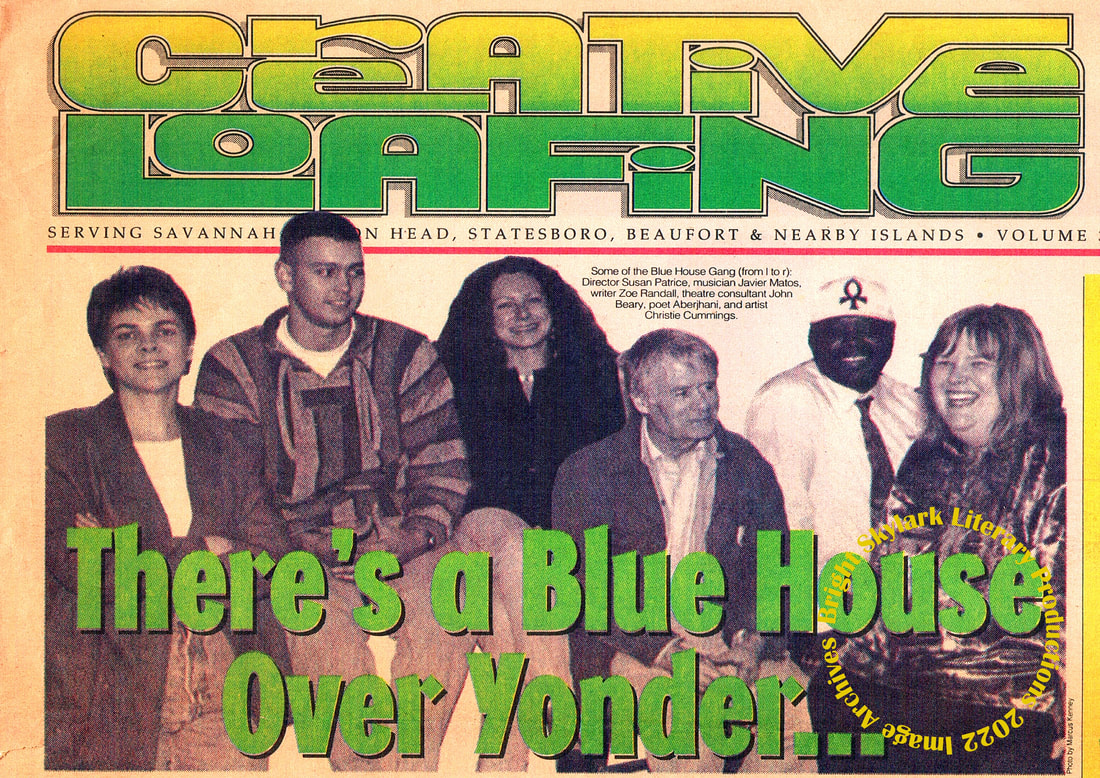 Pictured from far right to left are: “Christie” Cummings, Aberjhani, John Beary, Zoe Randall, Javier Matos, and Susan Patrice. (April 6, 1996 Creative Loafing photo by Marcus Kenney from Bright Skylark LP Archives. Originally published with story titled “Commune Strives to Blend Art and Life Into One Big Picture” by Bob Ruggiero) Some like-minded, and like-spirited, friends once told me that because we had spent so much time “meditating in the light together” we would always be connected on certain levels. That is how I feel about my now departed multi-talented friend Christia Cummings-Slack (?-2022): artist, spiritual coach, women’s empowerment advocate, angelologist, and courageous compassionate human being. We met in the mid-1990s during the hey-day of the former Blue House, described in Dreams of the Immortal City Savannah as a place were: “…artists, poets, musicians, soldiers, and social theorists had gathered to share their talents and talk about possibilities for Savannah’s future. There were black, white, Latino, male, female…” She was then a recent graduate of SCAD and I a bookstore manager also recognized as a columnist and poet. Christia, known then as Christine Cummings, was also a principal supporter of the now legendary Blue House and a member of the production team for its “’zine” journal publication: OUT OF THE BLUE. The theme for its fall 1996 issue was “A Celebration of Home.” Among the contributors were: now well-known artists like Marcus Kenney and James Russell May; plus, an excerpt from work by poet Audre Lorde (1934-1992) and poems by Blue House founder Susan Patrice, Kathleen Thompson, Don Newman, Louisa Abbot, and Zoe Randall (among others). Christine and I also contributed to that special historic issue. My contributions to the journal were the poem “Calligraphy of Intimacy” from I Made My Boy of Poetry, and a review of a mini-concert by a beloved acid-jazz rock group called the Hunab Ku Quartet. Christine may have been the most prolific contributor of us all to that second issue of Out of Blue. In addition to drawings and ads about workshops she was conducting, included was an untitled prose piece in which she reflected on the emotional pros and cons of going home for Thanksgiving. Within her words are clear signs of an evolving spiritual seeker as she notes observations like: “I have been learning lately that if you really need to do something or want something that is ultimately good for you, the energy will be there to make it so.” In response to an aunt’s interpretation of the sudden appearance of certain caterpillars, she later states: “…I feel as though I am in my cocoon already emerged in the darkness and beginning to transform into a soul that can fly free…” Christina also contributed to the Out of the Blue journal something which took me completely by surprise. It was a poem: Autumn by Christine Cummings She tires easy now The wind blows cooler Her color changes The wind blows faster Her color fades She misses the warmth of the sun and children playing around her. Soon she will be barren She will get sleepy and draw within herself and dream while her roots draw nourishment from the Great Source, the Great Mother, feeding her dreams of belonging and of coming HOME. The Blue House had to close its doors after a few years and our life paths led us in different directions determined by personal obligations. Via occasional in-person visits and a new thing called email, we managed to lose touch with each other reconnect many times over the years. We shared a passion for angel lore, which in her works manifested as inspiring art and channeled insights. In mine, it took the form of poems that gave birth to the book The River of Winged Dreams. We also both greatly appreciated and drew encouragement from the poetry of Rumi. All of this meant we were able to encourage each during uncertain times in our lives. She thought I got it wrong when I said a popular journalist friend of mine would likely become a friend of hers as well because I felt the essence of their natures to be very similar. She later decided I got it right. When we discussed the “possibility” of her becoming engaged to Richard Slacks Jr., something in her voice told me it was already a beautiful done deal, and one that would bless both their lives for a long time. It was an honor to watch, from a short distance, as she evolved in the manner which she sensed was to come when writing in Out of the Blue and became: Christia. I smiled to read the different testimonies of people who said she touched their lives in healing and sometimes life-changing ways. Almost like an Earth-Angel they had never dreamed of encountering. "BE LOVE"For her part, she knew her approach to spirituality would be viewed as “radical” by some and did not apologize for it. Just the opposite in fact: “I AM A Certified Angelic Life Coach, an Ordained Minister, Usui Reiki Master/Teacher, and hold a Bachelor of Fine Arts and a Master of Fine Arts in painting.” Such radicalism, if it really can be called such, seemed an essential antidote to the extremes of violence and hatred which flooded the world throughout her lifetime. This remembrance tribute to my friend could have ended with her poem. At this particular time in history, however, I feel it more important to end with the following words from her 2005 op ed letter published in CONNECT Savannah: “Now is the time to be Peace, Love, and Understanding in the face of conflict, pain, and suffering. Now is the time to BE LOVE.” Think of how much the world could gain at this very moment if humanity chose to take to its collective heart those extremely simple and profoundly wise words. Aberjhani |
| | |
“Loving, Happy, Untamed, Passionate"
Somebody call the cops!
My muse has been stolen
I repeat my muse has been stolen…
The pain of this crime is felt in each stanza as she dramatically describes the sleep deprivation and loss of creativity it has caused. Yet there is also gentle self-deprecating humor while observing:
I feel too normal
I need my abnormality back…
The depth of her need is amplified with the following simultaneously pleading and demanding lines:
I want it back the way it was taken
Opinionated, LOUD, wild, confused
Loving, happy, untamed, passionate
Smart enough, encouraging, kinda shy
Uncorrupted by the norms of society
Unpierced by the actions of my peers
AND ALL MINE
In the poems which flow immediately afterwards, titled “Nicking,” “Lost Scared Afraid,” and “My Muse,” the poet’s attachment to what most inspires her can be understood at different times in different ways. In one moment, it is an addiction of a healthy variety rather than a destructive one. In the next, it reads and feels a lot like a love affair brutally interrupted by the kind of heinous disregard which too often in our current over-technologized world leads to tragic consequences.
| | |
In the Tradition of Baring One’s Soul
Instead of offering strategies for navigating the painful uncertainties of her personal journey, the Savannah, Georgia-born poet simply presents her own efforts at balancing them. In this way, she self-identifies with humanity as a whole rather than with a single segment of it. Near the end of the volume, she notes the following in a letter to herself:
I know you
From your favorite color
To your deepest secrets
From your untold feelings
To your wildest dreams
I care about
Your every word
Simplest request
Smallest dreams…
There is a tremendous amount to appreciate in this first edition of Aurie Cole’s debut volume as her pen makes its free-styling way through shock and despair toward hope and self-determination. However, it has to be said as well that serious readers of poetry are likely to find a number of typographical errors distracting. These are understandable enough because talented young poets rarely receive the kind of publishing support which ensures the absence of such mistakes. (How many, after all, such as the celebrated Amanda Gorman are likely to receive an invitation to recite their poetry at a presidential inauguration and subsequently get Oprah Winfrey to write a foreword for their book, basically guaranteeing its status as a number 1 bestseller?)
Other critically-minded readers may question the absence of poems dealing with such timely issues as the COVID-19 pandemic, climate change, or Black Lives Matter. In a way, it may be argued that the more deeply personal writings inspired by the poet’s muse are a kind of response to these very concerns as they illustrate the power of sheltering within the integrity of one’s own sanity in a world knocked off balance by myriad forms of chaos. The important thing may be the knowledge that Talks Between My Pen and Muse is only a first important literary step for Aurie Cole and readers hopefully can look forward to many more writings from her pen and muse in the future.
Aberjhani
Author of Greeting Flannery O'Connor at the Back Door of My Mind
Creator of Authentic Silk-Featherbrush Artstyle
| | |
| | |
She followed the novel Wise Blood with a collection of short stories, A Good Man is Hard to Find, in 1955; the novel The Violent Bear it Away in 1960; and the short story collection Everything That Rises Must Converge ––a book on which she worked virtually right up until her death–– published posthumously in 1965. In between the writing and the publishing, she marshaled her strength to travel (aided by crutches) and lecture, write articles for popular magazines (for which she was generally well paid), and write numerous letters to friends, supporters, and critics.
(To read part 1 of this story please click here. For part 2 click this link.)
The O’Connor readers and scholars now know would not have been possible without a tightly woven network of friends and family members who supported her work through belief in, and out of love for, her. After illness derailed her plans to live the life of a postmodern New York author, she famously surrounded herself with peacocks at Andalusia, her family’s farm, and allowed the world to come to her just as much as she continued to embrace it on the page and through speaking engagements. Fellow authors, theologians, aspiring writers, general admirers, and would-be lovers in the form of men as well as women often made their way to her front door.
| | |
| | |
Mother and Daughter Together
As such, she did the kinds of things caregivers tend to do when committed to ensuring as high a quality of life as they can for someone they love: setting aside a thermos of hot coffee at night to share with Flannery in the morning, running a farm to secure an income, tolerating the droppings and cries of beautiful but annoying peacocks, traveling abroad with her daughter even when she herself was ill, and standing guard at her hospital room door to ensure a chance at rest and possible recovery.
| | |
In Praise of Those Who Wait
Then, approached by an editor in 2003 about a biography on O’Connor, it clearly was not an offer he could refuse. A dream which had been deferred for more than two decades finally saw the light of day in 2009 and by most accounts it was very much worth the wait.
Author
Aberjhani is co-author of Encyclopedia of the Harlem Renaissance as well as author of Dreams of the Immortal City Savannah and Greeting Flannery O'Connor at the Back Door of My Mind.
| | |
A second shared hint is his struggle over whether to spell out the word "nigger" in this book's title or employ the more politically-accepted abbreviation. Following his publisher's suggestion, he chose the latter but felt the original more "symbolic of my struggle as a black male in American society." With that in mind, the book in general, he states, "documents my struggle to achieve the American Dream while having to confront the vicissitudes of being black in a racist society" (p. 11)
|
|
|
A Timeline of Powerful History
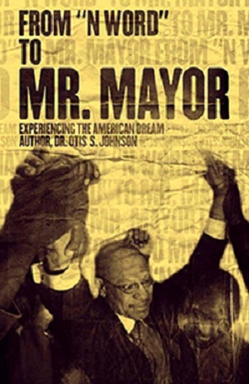 From 'N Word' to Mr. Mayor, Experiencing the American Dream autobiography by Dr. Otis S. Johnson.
From 'N Word' to Mr. Mayor, Experiencing the American Dream autobiography by Dr. Otis S. Johnson.
For its precisely-balanced combination of social history and personal memoir, Johnson's book under any title is one of the most valuable written in recent years by an African-American man, and one of the most important for any time by a native of Savannah, Georgia. Being the former dean of Savannah State University's College of Liberal Arts and Social Sciences, and current Scholar in Residence and Professor Emeritus that he is, Dr. Johnson's text often reflects the language of his intellectual leanings. That allows him to place his life and his times within an analytical context similar to important works by some of his scholarly heroes, like Harlem Renaissance strategist W.E.B. Du Bois and political scientist Hanes Walton Jr.
Yet, at the same time, he is a very down-to-earth writer who engages readers with stories of his family's Gullah culture heritage, what it meant to lose his father at an early age, learning about racism for the first time, falling in love and getting his heart broken, discovering the world as a young sailor, and confronting the challenges of leadership within a demographically-evolving community.
|
|
|
Anti-racism Activism
Of his position in this history, Johnson writes, "My life has been full of being in places where I shocked non-blacks with my presence" (p. 88). One such place was on the campus of Armstrong State College (now Atlantic University) where in 1963 he famously became the first African American to enroll in the school. Another was the campus of the University of Georgia, Athens, where he was the first Black from Savannah to attend that institution. At UGA, he walked out of one class after a white professor discussing the U.S. Supreme Court's landmark Brown vs. Board of Education decision proclaimed the only reason African-Americans wanted to integrate schools in Georgia was to marry white women.
|
|
|
Most of the kind of anti-racism activism Johnson chronicles is to be expected given the time-frame. In his chronicling, however, he provides important snapshots of black leaders in Savannah, like Wesley Wallace "W.W." Law and Hosea Williams, in political action. But his reportage goes beyond the dynamics of blackness clashing with whiteness.
Through his account of how segregation laws prevented Whites from attending the historically black Savannah State College, founded some 45 years prior to the establishment of Armstrong (as a junior college) in 1935, he demonstrates how racism has caused grievous injury on both sides of the color line. It has also been extremely absurd when considering that in order for him to become the first African-American to integrate Armstrong in 1963 for sake of racial progress in the name of democracy, he had to switch from Savannah State's senior college program curriculum to Armstrong's junior college curriculum.
Navigating Major Changes
By the time Dr. Johnson took office in 2004 as the sixty-fourth mayor of Savannah, and its second consecutive black mayor (after the late Floyd Adams), the city was well on its way to navigating major changes in its multicultural and economic make-up. His determination to meet that challenge at every level resulted in 2006 in a major heart attack experienced while attending the National Conference of Black Mayors in Memphis, Tennessee. Consequently, he writes, "How I approached the job of being mayor during the period before and the period after my heart attack were two very different periods" (p. 291).
"In 2011, we were still in the greatest economic downturn since the Great Depression. We had to find a way to continue providing all of the services to citizens with about $8 million less than we had in 2010...while the 2011 budget was extremely difficult, it was balanced with minimal impact to our citizens and without an increase in property taxes. That was due to strong leadership, clear priorities, and tough resolve by this council, which chose not to spend wildly when times were good" (p. 325).
Candidates lining up for the 2020 presidential race in America could take a few helpful lessons from this former mayor's playbook. One might be committing to running a campaign based on proven abilities and a strategic comprehensive vision rather than one based on negative personal attacks. In fact, though he won his first election to mayor before former U.S. President Barack H. Obama won his first election to the White House, their campaign styles bore striking similarities. (The president and mayor met when Mr. Obama visited Savannah in 2010.)
Conclusion
Aberjhani
Author of Dreams of the Immortal City Savannah
|
|
|
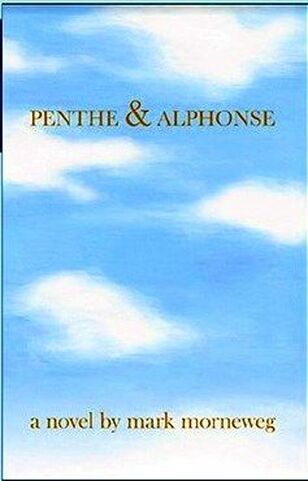
Having explored fusions of poetry and prose in works of my own with varying levels of success, I wondered how well Morneweg had met this challenge he issued to himself. Once I began reading in earnest, the chapters seemed to alternate like sequences in a film. They moved back and forth between flickering flashes of moments and extended scenes from the characters' private lives and America's public tragedy, also known as the Civil War. It soon became apparent the author has struck a masterful balance of historical detail, lyrical rhythm, and finely-nuanced emotional intensity.
The book begins with Alphonse's older sisters looking from a window down on him and Penthe, two former childhood playmates now entering adulthood, in a New Orleans courtyard reading poetry by Francois Villon. The delicate intimacy between them is apparent and alluring. But because he is categorized racially as white and she, in the language of 1800s American south, as a biracial "octoroon" (meaning "three quarters French and one black") their intense intimacy is also dangerous. In addition, despite racial categorizations, they are second cousins.
The kind of relationship Penthe and Alphonse had during childhood was not uncommon for the time, but most children were expected to "grow out of it" as they matured and retreat to their respective black and white demographic niches. Alphonse's and Pense's relationship, however, continues to develop through a series of circumstances along a more sensuous, humane, and uncompromising trajectory.
| | |
Distance Making Hearts Grow Fonder
Alphonse,
Penthe in Paris--A letter from a sweet girl to her
beloved friend back home in New Orleans.
You know I am not sweet.
Ha!
They want us to practice writing in a foreign language, so
I am writing this in English. We are trilingual, you and
I, -- our native Creole, French, and English.
That makes us complex...
Adieu,
Penthe
One letter comes from Alphonse after Penthe writes him to confess she may allow herself to be seduced by a "knucklehead...strapling youth" with a reputation for introducing willing young women to sex. It is not the response either Pense or the reader might have expected:
Penthe,
I will not come to Paris to save you.
Are you just trying to be funny with all of your ha-ha's?
Justine is barely a passing fancy. I cannot see you
with a knucklehead.
I will want you any way you are--
Je t'aime,
Alphonse
Exchanging letters becomes a practice on which they depend during several trials of separation. It is to the author's credit that he fashions this technique as deftly as he does into an already impressive collage of linguistic versatility.
Complications of Love, War, and Race
| | |
Racism directed against Penthe is something Alphonse makes clear he will not tolerate. When another man calls her "a part-nigger whore," he challenges him to a dual and manages to shoot him without killing him. At the same time, he suffers through moral ambivalence when it comes to fighting in the Civil War, demonstrating how complex the issues behind it truly were: "If the Yankees invade, I will fight them. I will fight, but I am not too thrilled. I will not be morbid in front of Penthe Anne." Such reasoning brings to mind the song by Sade: Love Is Stronger Than Pride.
From one minimalist chapter to the next, they love their way through war, two epidemics of Yellow Fever, race riots, the demands of grandchildren, and old age. Looking at a printed copy of Penthe & Alphonse, or even just the cover on a screen after reading the book, gives the feeling of staring at an optical illusion because Morneweg has managed, somehow, to deliver much more than what appearance promises. The range of time covered, scope and depth of emotions engaged, and intricacy of styles employed seem too much for the pages containing them.
What Geek Bookaholics Often Do
| | |
In the course of reading Penthe & Alphonse, I began to do what geek bookaholics often do when sensing that within their hands is not just a good book but a rare and beautiful kind of priceless mind. I began attempting to discern who the author's strongest literary influences had been. I could hear William Faulkner's spirit wandering between lines while meditating on the nature and traumas comprising the identity (or should we now say identities?) of the American south. But who were the others?
The answer came one day when I was discussing the title with a friend and she loaned me a copy of a booklet about one Mark Louis Morneweg published by El Portal Press. In it, he noted his passion for "Miss Emily [Dickinson]"along with deep appreciation for others who had also helped stir to action my own pen. Among them: Federico Garcia Lorca, Pablo Neruda, James Joyce, Shakespeare, Franz Kafka, Marcel Proust, and Albert Camus.
He shared these words in regard to his approach to writing fiction: "Unplanned adventures in literature. An idea pops into your head and you go from there. Nothing structured or laid out beforehand. Just one word comes and you have an entire chapter to write and that is great..." (The only time I had ever allowed myself that kind of compositional freedom was while writing Christmas When Music Saved the World, later titled Songs from the Black Skylark zPed Music Player.)
Maybe even more importantly for the purposes of this essay, he told us this: "...I am a prose stylist with some amazingly short chapters. Some chapters that are poems. Prose poems." And added: "Penthe is about taking risks. Artistic risks. Passion..." The risk was one that paid off extremely well because ultimately Penthe & Alphonse succeeds as both an epic poem and an amazing novel.
Moreover, in addition to taking risks, it is also about what Lady Gaga refers to as the right to curate one's life as one sees fit. Along those same lines, Morneweg chose not to douse the flames of his startling creative literary inventiveness. He chose instead to feed the fire with boldness sufficient enough to increase its light and heat so others could gather around and savor the prize of unexpected beauty.
| | |
By Aberjhani
Harlem Renaissance Centennial
Co-author of Encyclopedia of the Harlem Renaissance
Author of Greeting Flannery O'Connor at the Back Door of My Mind
| | |
Archives
November 2023
June 2023
February 2023
December 2022
June 2022
February 2022
November 2021
September 2021
April 2021
March 2021
December 2019
November 2019
June 2019
May 2019
March 2019
January 2019
October 2017
July 2017
August 2012
Categories
All
1950s
1960s
2022 Russia Ukraine War
20th Century Authors
21st Century Artists
21st Century Authors
21st Century Poets
Aberjhani
Aberjhani Observance Of National Poetry Month
Aberjhani On Aurie Cole
Aberjhani On Brad Gooch
Aberjhani On Chinese Famine
Aberjhani On Dick Gregory
Aberjhani On Duncan McNaughton
Aberjhani On Eugene Talmadge
Aberjhani On Flannery O'Connor
Aberjhani On Immigration
Aberjhani On Jean-Paul Sartre
Aberjhani On Mao Zedong
Aberjhani On Mark Morneweg
Aberjhani On Maya Angelou
Aberjhani On Otis S. Johnson
Aberjhani On Paul Laurence Dunbar
Aberjhani On PT Armstrong
Aberjhani On Russia Ukraine Was
Aberjhani On Savannah Georgia
Aberjhani On Savannah-Georgia
Aberjhani On Yang Jisheng
Adapting Books For Film
Africa
African American Authors
African-American Authors
African-American Comics
African American History Month
African American Men
African-American Men
African Americans
African Americans Abroad
African Americans In Japan
African Americans Living Outside America
African American Writers In Savannah GA
African Diaspora
African Engineers
African Writers
AI Literary Chat Salon
Alice Walker
Amanda Gorman
American Artists
American Authors
American Civil War
American PEN Video
Andrew Davidson
Angel Art
Angel Lore
Angel Meme
Angel Of War And The Year 2022
Angelology
Annie Cohen-Solal
Antiracism
Archangel Michael
Art By Aberjhani
Art By Christia Cummings-Slack
Artist-Author Aberjhani
Artist James Russell May
Artist Marcus Kenney
Asian Authors
Audio Podcast
Aurie Cole
Author Brad Gooch
Author Connie Zweig
Author Franklin D. Lewis
Author Interview
Author Mark Morneweg
Author Poet Aberjhani Official Site
Author-Poet Aberjhani - Official Site
Authors
Authors From Savannah Georgia
Ava DuVernay
Benjamin Hollander
Benjamin Van Clark Neighborhood
Ben Okri
Ben Okri Videos
Best Interviews Of 2023
Bill Berkson
Biography
Biracial Relationships
Biracial Women
Black History Month
Black Men Who Write
Black Movie Directors
Black Women Authors
Blogs By Aberjhani
Booker Prize For Literature
Booker Prize Winners
Book Industry
Book Publishing
Book Reviews
Book Reviews By Aberjhani
Books
Books About Rumi
Books About Savannah-Georgia
Books About Sufism
Books And Authors
Books By Aurie Cole
Books By Darrell Gartrell
Books By Flannery O'Connor
Books By Patricia Ann West
Books By PT Armstrong
Books By Robert T.S. Mickles Sr.
Books By Rotimi Ogunjobi
Books On Flannery O'Connor
Brad Gooch
Brad Gooch Audio Podcast
Brunswick Georgia
Canadian Authors
Canadian Novelists
Carlos Ruiz Zafon
Caste The Origins Of Our Discontents
Celebrity Authors
Children's Literature
Chinese Authors
Chinese History
Christia Cummings-Slack
Christina Cummings-Slack
Christine Cummings
Classic Authors
Connie Zweig
Contemporary African Literature
Contemporary African Writers
Contemporary Artists
Contemporary Authors
Contemporary Canadian Authors
Contemporary Literature
Contemporary Southern Literature
Cormac Mccarthy
Cornel West
Creative Nonfiction
Creative Thinkers
Cultural Demographics
Cultural Heritage
David Gordon Green
Dick Gregory Videos
Digital Publishing
Director Regina King
Director Steve McQueen
Doctorate In Literature
Dreams Of The Immortal City Savannah Book By Aberjhani
Duncan McNaughton
Ebooks
Education
El Portal Press
English As A Second Language
English Learning Students
Essay On 21 Years Of Wisdom
Essays By Aberjhani
Essays On Ben Okri
Essays On Duncan McNaughton
Essays On Flannery O'Connor
Essays On Immigration
Eugene Talmadge
Eugene Talmadge Memorial Bridge
Evolving Cultures
Existential Creativity
Existentialism
Fall Of The Rebel Angels
Famous Women Artists
Fiction
Filming Movies In Savannah-Georgia
Flannery O'Connor
French Authors
French Literature
Genre Bending Literature
Genre-bending Literature
Global Community
Grandmothers
Great Sufi Poets
Greeting Flannery O'Connor At The Back Door Of Mind Book By Aberjhani
Gullah Geechee Culture
Gustave Flaubert
Halloween's End
Hector France
Historical Fiction
Historical Poetry
History
History Of Civil Rights Movement
History Of Famines
History Of Literature
History Of Racism
Human Cannibalism
Iconic Authors
Immigrant Experience
Immigration Policies
Influential Authors
International Authors
International Poets
Interracial Relationships
Interview
Isabel Wilkerson
Jalal Al-Din Mohammad Balkhi
Jalal Al Din Mohammad Rumi
Jalal Al-Din Mohammad Rumi
James Joyce
Jean Genet
Jean-Paul Sartre
Jelaluddin Rumi
Jim Crow Racism
Lady Gaga
Latino Ficiton
Leadership Philosophy
Leadership Theory
Life And Legacy Of Dick Gregory
Life And Legacy Of Flannery O'Connor
Lillian Gregory
Literary Biographies
Literary Community
Literary Criticism
Literary Essays
Literary Friendships
Literary History
Literary Honors
Literary Influencers
Literary Influences
Literary Legacies Of The South
Literary Prizes
Literary Traditions
Literary Translations
Literature Of Immigration
Luca Giordano
Memoir
Memoir By Darrell Gartrell
Michal Majernik
Movie Sets
Mythology
National Poetry Month
Naturalism Fiction
New Orleans
Nicanor Parra
Nigerian Authors
Nigerian Literature
Nigger By Dick Gregory
Nobel Laureates
Nonfiction
Novels
Official Site For Author Poet Aberjhani
Official Site For Author-Poet Aberjhani
Official Website Of Author Poet Aberjhani
Official Website Of Author-Poet Aberjhani
Oklahoma City
Oprah Winfrey
Patricia Ann West
PEN America
PEN International
Philosophy
Podcast On Literature
Poems About Savannah-Georgia
Poems By Patricia Ann West
Poetry
Poetry By Aurie Cole
Poetry By Duncan McNaughton
Poets Against War
Poets From
Poets From Afghanistan
Poets From Boston
Poets From Savannah Georgia
Poets From Savannah-Georgia
Poets On War
Political Activism
Political Biographies
Political Strategies
Political Theories
Postered Poetics Art By Aberjhani
Predatory Gentrification
Preventing Erasures Of History
Prose And Poetry
Prose Poem
Public Intellectuals
Public School System
Publishers
Publishing
Publishing Options
Putin Attacks Ukraine
Q&A With Author
QOTD Quote Of The Day
Quentin Tarantino
Quotations
Quotes By Dick Gregory
Quotes By Flannery O'Connor
Quotes By Mark Morneweg
Race In America
Race In Japan
Racism In Georgia
Racism In Savannah
Racism In The United States
Reiki Master
Richard Wright
Rotimi Ogunjobi
Rumi's Birthday
Russian Invasion Of Ukraine
Russia Ukraine Conflict 2022
Russia Ukraine Video
Russia Ukraine War
Salman Rushdie
Sandfly In Savannah Georgia
San Francisco Poets
Savannah College Of Art And Design Graduates
Savannah Georgia
Savannah-Georgia
Savannah River
Savannah State University
SCAD Graduates
Singer Sade
Social Activism
Social Realism
Somewhere In The Stream By Duncan McNaughton
South Carolina
Southern Legacies
Spike Lee
Spiritual Counseling
Spirituality
Starvation
Still Water Words
Sufi Literature
Talks Between My Pen And Muse
Teachable Take-Aways
Text And Meaning Series By Aberjhani
The American Poet Who Went Home Again
The Angel's Game
The Famished Road
The Gargoyle By Andrew Davidson
The River Of Winged Dreams
The Word "Nigger"
Toni Morrison
Transgression Fiction
Transgression Literature
Transgressive Literature
Tribute To Dick Gregory
Ukraine Russia Crisis 2022
Video
Video Podcast
Video Poem
Videos About Rumi
Videos On Literature
Wakanda Forever
War And Peace
William Anderson
Wisdom21
Women Artists
Women Authors
Women Poets
Women's Voices
World Community
World History
World Poetry Day
Writers And Writing
Xenophobia
Yang Jisheng
Year 2022 In Review
Yoko Ono
YouTube Videos
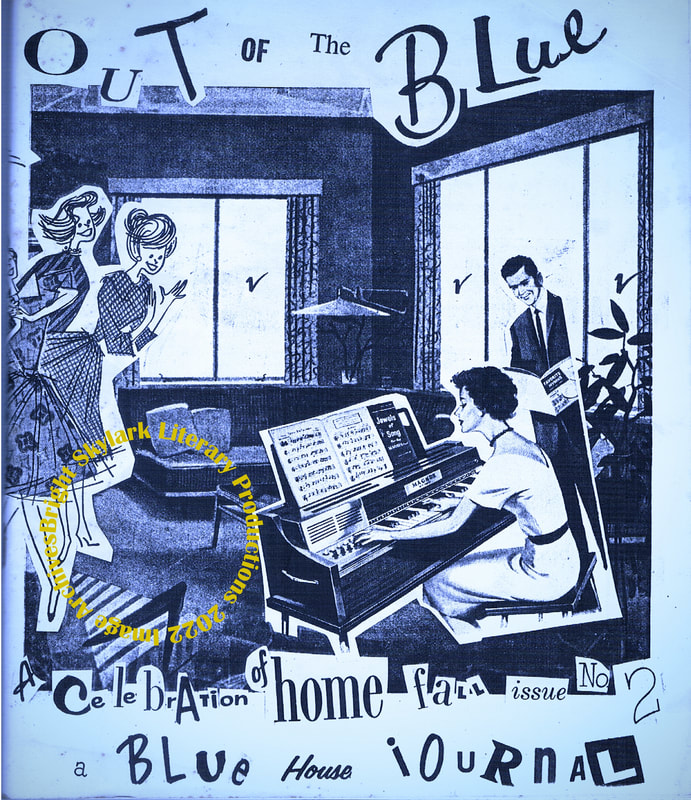
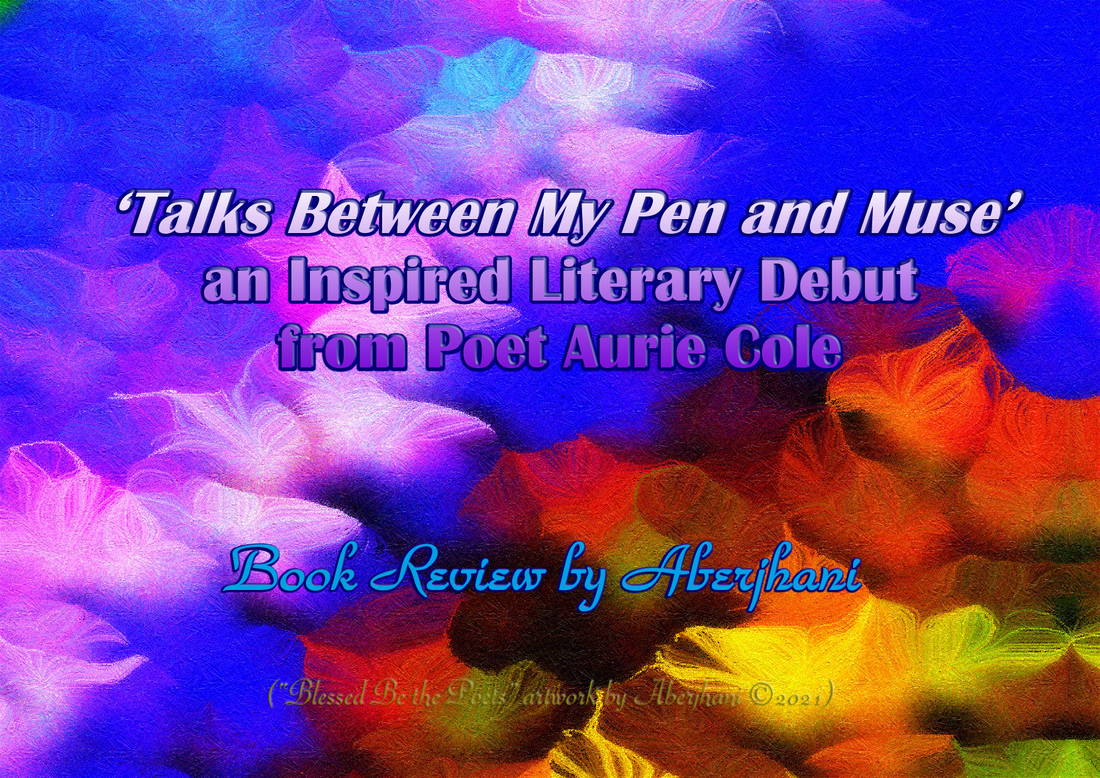
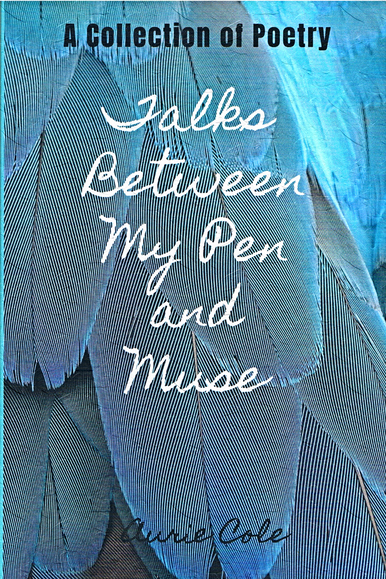
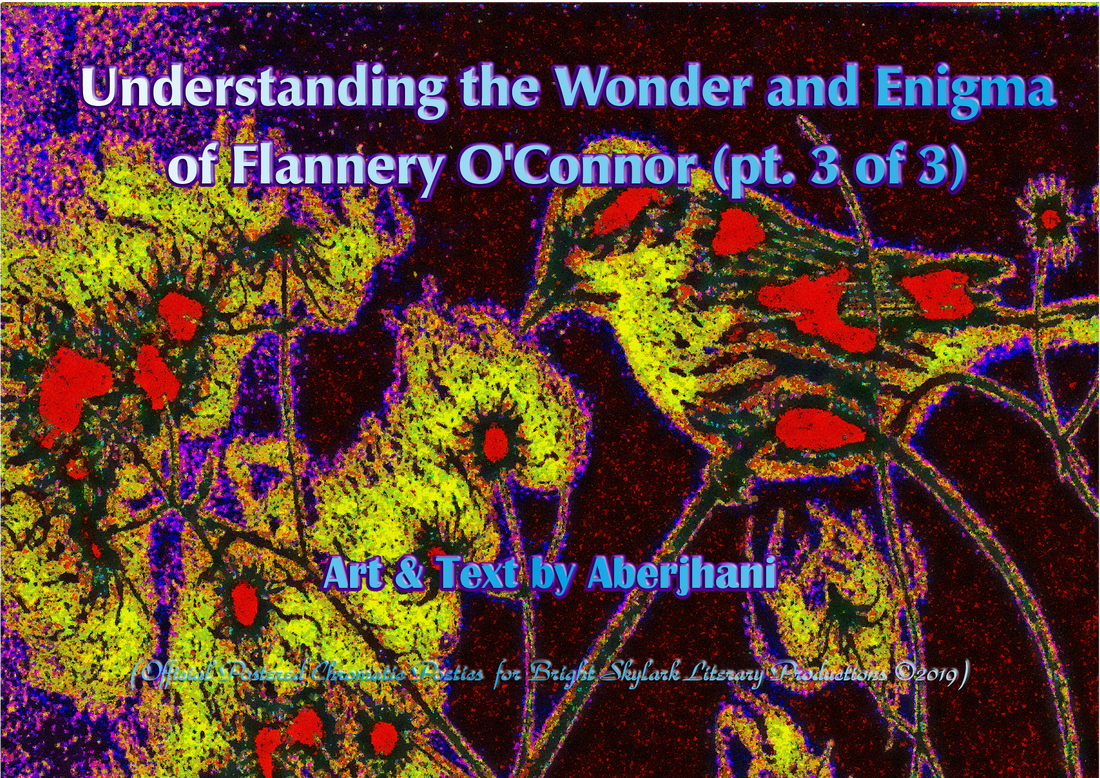
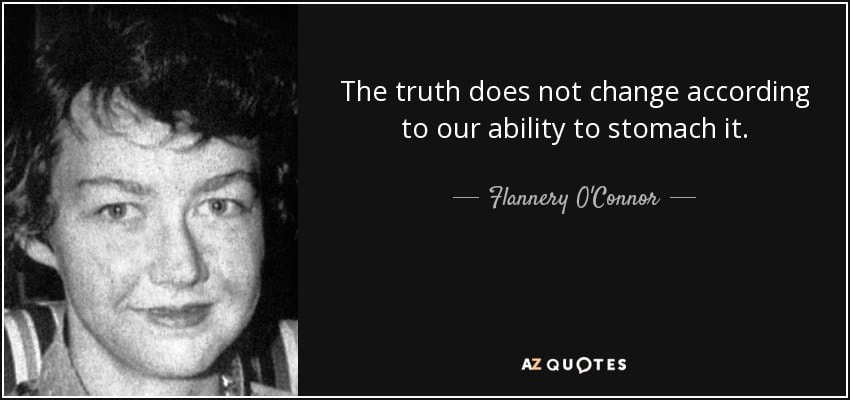
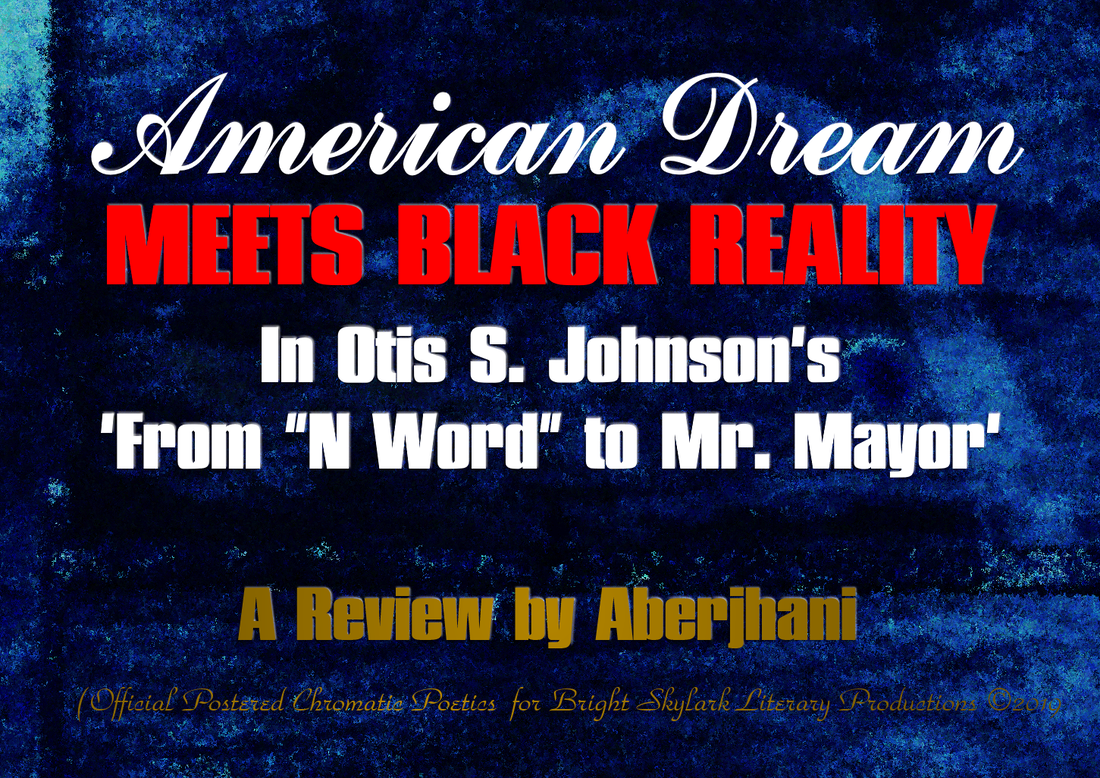
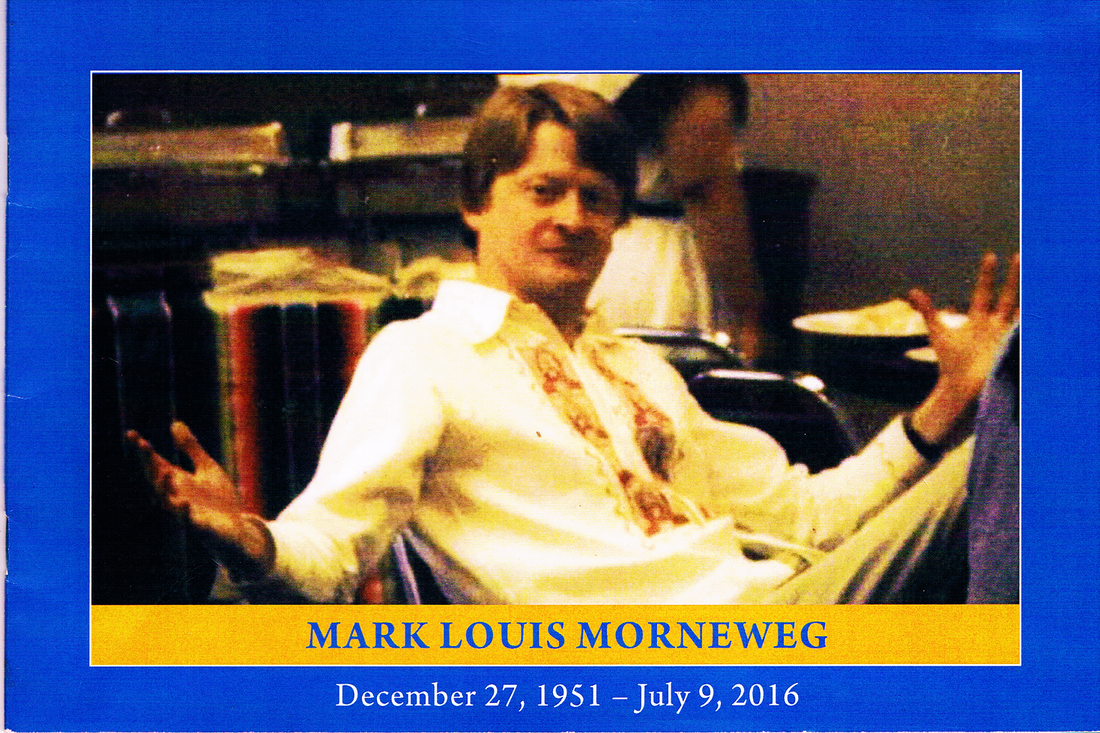
 RSS Feed
RSS Feed